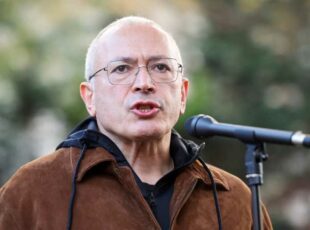Le Monde: Mikhail Khodorkovsky declared “terrorist” by Kremlin

The Parliamentary Assembly of the Council of Europe voted to create a “platform of dialogue” with the “Russian democratic forces in exile”.
His first interlocutor: Mikhail Khodorkovsky, an influential but non-consensual figure of the opposition to Vladimir Putin.
Imprisoned for ten years in Siberia, in exile in London for a decade, Mikhail Khodorkovsky, 62, has just found himself on the list of “terrorists” wanted by the Kremlin. “I prefer to laugh about it,” the former oligarch, who has become one of the main figures of Russian dissent abroad, said. Convicted after a politically motivated trial, the former head of the oil group Yukos, who was released on December 20, 2013, is now travelling across Europe in the hope of uniting opposition against Vladimir Putin and his war in Ukraine.
“From the outset, we agreed on this consensus: to oppose, but without resorting to force. Quite a paradox today. Here we are, being prosecuted by Russia for radical methods that we have always rejected!” protests Mr Khodorkovsky, whom we met on Monday 3 November in Brussels, on the sidelines of the conference he organised with his Russian Anti-War Committee, created on 27 February 2022, three days after the large-scale invasion of Ukraine. Surrounding him were dozens of opponents, political figures and civil society leaders who have also been targeted since 14 October by the FSB (Federal Security Service, one of the successors to the KGB) for belonging to “a terrorist community” and “attempting to seize power by force”.
“Aren’t you afraid to talk to terrorists?” Kirill Martynov, editor-in-chief of Novaya Gazeta Europe, one of the Russian opposition media outlets in exile, asked ironically at the start of the conference. He too is on the FSB’s list, along with some twenty other members of the Russian Anti-War Committee, including former Prime Minister Mikhail Kasyanov (2000-2004), world chess champion Garry Kasparov, politician Vladimir Kara-Murza, lawyer Elena Lukyanova, gallery owner Marat Gelman, entrepreneur Evgeny Chichvarkin, political scientist Ekaterina Schulmann, economist Sergey Aleksashenko, comedian Victor Shenderovich, and others. All are fierce critics of Putin’s regime. “If the Kremlin has given its approval to launch such harsh proceedings against us, it is because, de facto, we have become important in its eyes. This only strengthens our mission even more!” says Kirill Martynov passionately.
In a calm voice, Mikhail Khodorkovsky similarly asserts: “The Kremlin fears the emergence of a consolidated opposition that, capable of reaching agreement despite its divisions, would be recognised and legitimised abroad.” This is no coincidence: these criminal proceedings for “terrorism” came just two weeks after the Parliamentary Assembly of the Council of Europe (PACE) voted on 1 October to create a “platform for dialogue” with “Russian democratic forces in exile”. The aim, four years after Russia’s exclusion from the Council of Europe due to its invasion of Ukraine, is to form an opposition delegation. It will not be allowed to use the symbols of the Russian state, but will be able to display the white, blue and white colours adopted by many in the opposition.
Risk factor for the regime
“Mr Putin usually hates to react quickly to external pressure. This time, the authorities responded quickly in order to demonise us and discredit us. We have become a risk factor for the regime: the emergence of an alternative centre of political power, recognised by an international institution, threatens its existence,” says Mr Khodorkovsky.
While acknowledging the very limited influence of the Council of Europe, he asserts that this initial legitimisation of the Russian opposition in exile “is only a first step” towards a possible scenario of political transition in Moscow. “If events unfold rapidly, we could come to power,” imagines Mr Khodorkovsky, who was Russia’s richest man in the early 2000s and, at the time, close to the Kremlin. Optimistic, the former oligarch, who finances various projects for democracy, says he is convinced that “Mr Putin’s regime will eventually fall”.
At present, such a scenario seems highly hypothetical. “Russia was excluded from the Western diplomatic scene after its invasion of Ukraine. But we must not forget the many Russians who oppose the war. It is this Russia that we recognise and support,” insists Eerik-Niiles Kross, Estonian member of the PACE and, within that Assembly, general rapporteur on Russian democratic forces.
Old tensions
Nevertheless, the Council of Europe’s decision quickly reignited old tensions between the various components of the opposition: the “dialogue platform”, whose composition remains to be determined, does not currently include Alexei Navalny’s Anti-Corruption Foundation (FBK). The most famous of the anti-Kremlin opposition leaders, who died in detention on 16 February 2024, was a long-time opponent of Mr Khodorkovsky.
“We do not trust the former oligarch: he acts more for money than for ideas, to establish himself as the leader of the dissidents, and then to better defend his economic interests,” says a close associate of FBK, based in Brussels. Debates on the criteria for inclusion in the future delegation and heated exchanges between different groups in exile are therefore only just beginning ahead of the next PACE plenary session at the end of January 2026. This is much to the satisfaction of the Kremlin: the regime has always sought to divide the opposition to prevent the emergence of any alternative centre of legitimacy.
The article by Benjamin Quénelle (Brussels, special correspondent) was originally published in Le Monde



